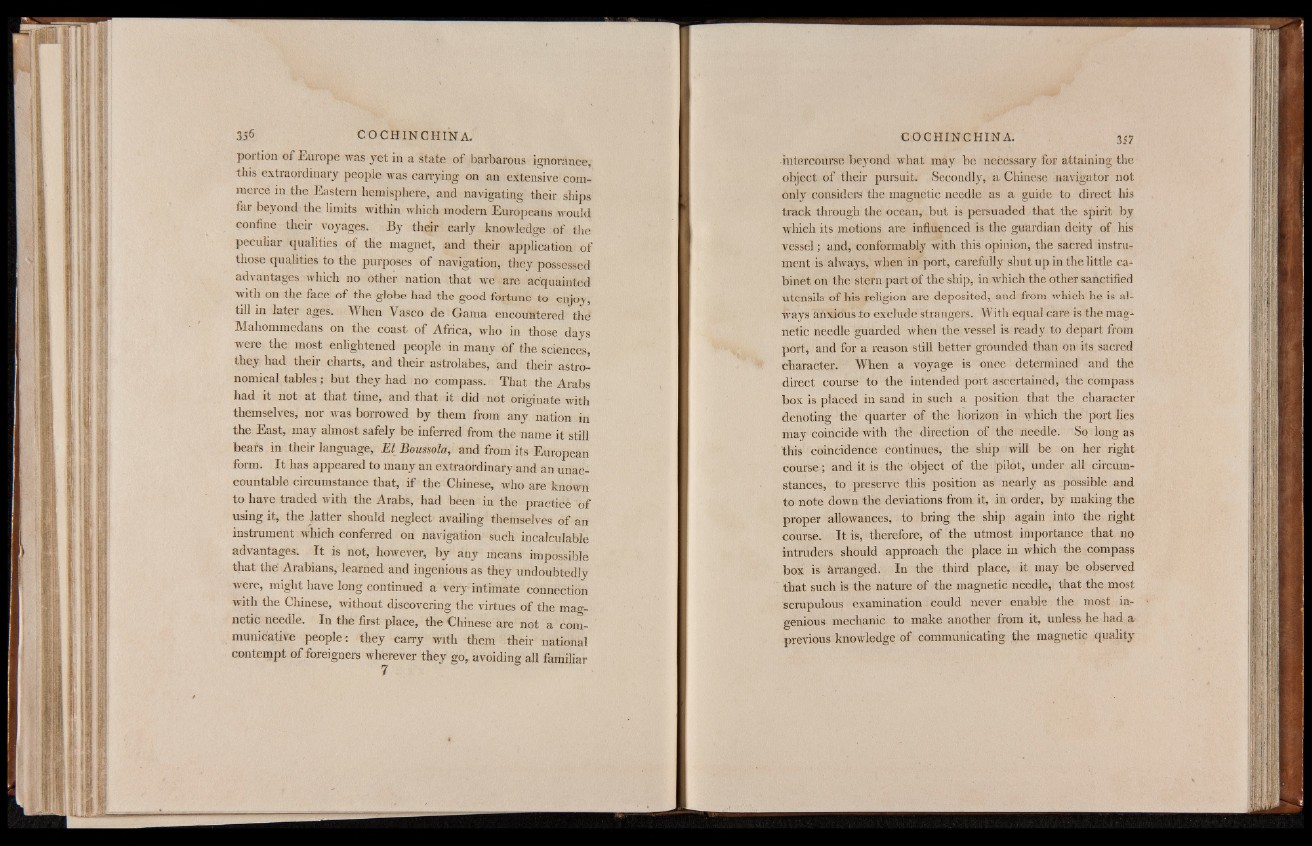
portion of Europe was yet in a state of barbarous ignorance,
this extraordinary people was carrying on an extensive commerce
in the Eastern hemisphere, and navigating their ships
far beyond the limits within which modern Europeans would
confine their voyages. By their early knowledge of the
peculiar qualities of the magnet, and their application of
those qualities to the purposes of navigation, they possessed
advantages which no other nation that we are acquainted
with on the face of the globe had the good fortune to enjoy,
till in later ages. When Vasco de Gama encountered the
Mahommedans on the coast of Africa, who in those days
were the most enlightened people in many of the sciences,
they had their charts, and their astrolabes, and their astronomical
tables ; but they had no compass. That the Arabs
had it not at that time, and that it did not originate with
themselves, nor was borrowed by them from any nation in
the East, may almost safely be inferred from the name it still
bears in their language, E l Boussola, and from its European
form. I t has appeared to many an extraordinary and an unaccountable
circumstance that, if the Chinese, who are known
to have traded with the Arabs, had been in the practic'd of
using it, the latter should neglect availing themselves of an
instrument which conferred on navigation such incalculable
advantages. I t is not, however, by any means impossible
that the Arabians, learned and ingenious as they undoubtedly
were, might have long continued a very intimate connection
with the Chinese, without discovering the virtues of the magnetic
needle. In the first place, the Chinese are not a communicative
people ; they carry with them their national
contempt of foreigners wherever they go, avoiding all familiar
7
intercourse beyond what may be necessary for attaining the
object of their pursuit. Secondly, a Chinese navigator not
only considers the magnetic needle as a guide to direct his
track through the ocean, but is persuaded that the spirit by
which its motions are influenced is the guardian deity of his
vessel; and, conformably with this opinion, the sacred instrument
is always, when in port, carefully shut up in the little cabinet
on the stem part of the ship, in which the other sanctified
utensils of his religion are deposited, and from which he is always
anxious-to exclude strangers. With equal care is the magnetic
needle guarded when the vessel is ready to depart from
port, and for a reason still better grounded than on its sacred
character. When a voyage is once determined and the
direct course to the intended port ascertained, the compass
box is placed in sand in such a position that the character
denoting the quarter of the horizon in which the port lies
may coincide with the direction of the needle. So long as
this coincidence continues, the ship will be on her right
course; and it is the object of the pilot, under all circumstances,
to preserve this position as nearly as possible and
to note down the deviations from it, in order, by making the
proper allowances, to bring the ship again into the right
course. I t is, therefore, of the utmost importance that no
intruders should approach the place in which the compass
box is Arranged. In the third place, it may be observed
that such is the nature of the magnetic needle, that the most
scrupulous examination. could never enable the most ingenious
mechanic to make another from it, unless he had a
previous knowledge of communicating the magnetic quality